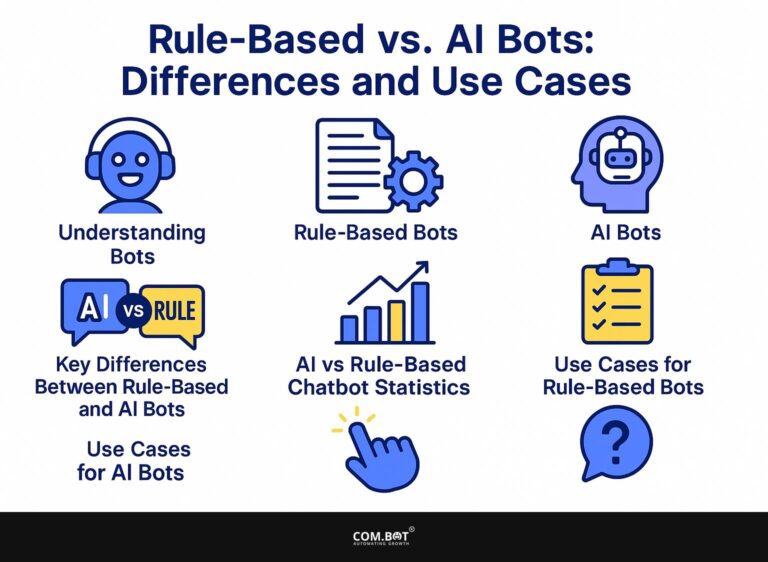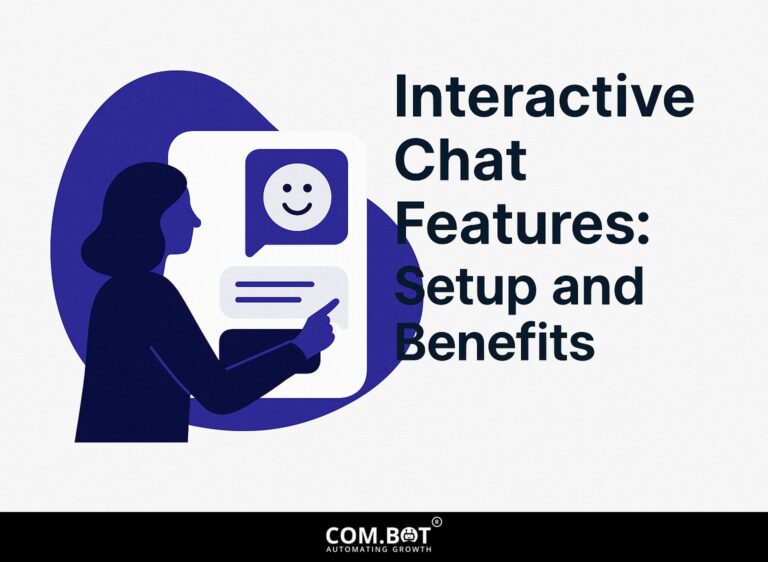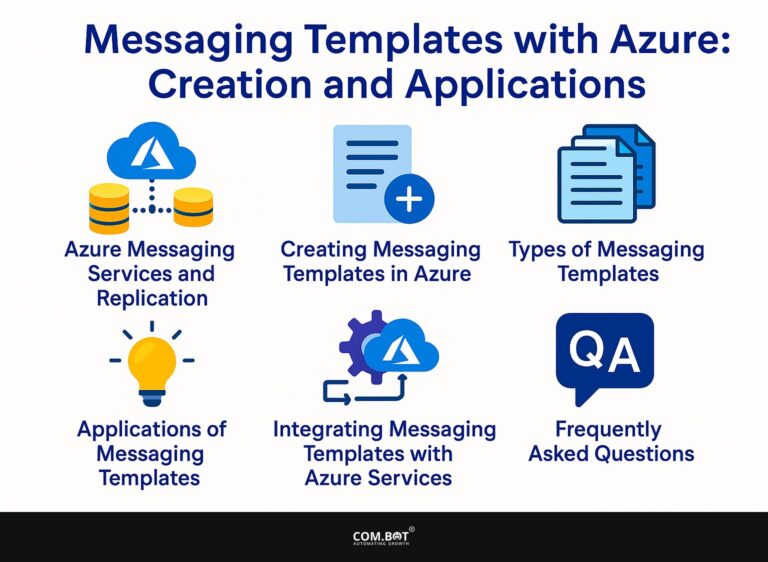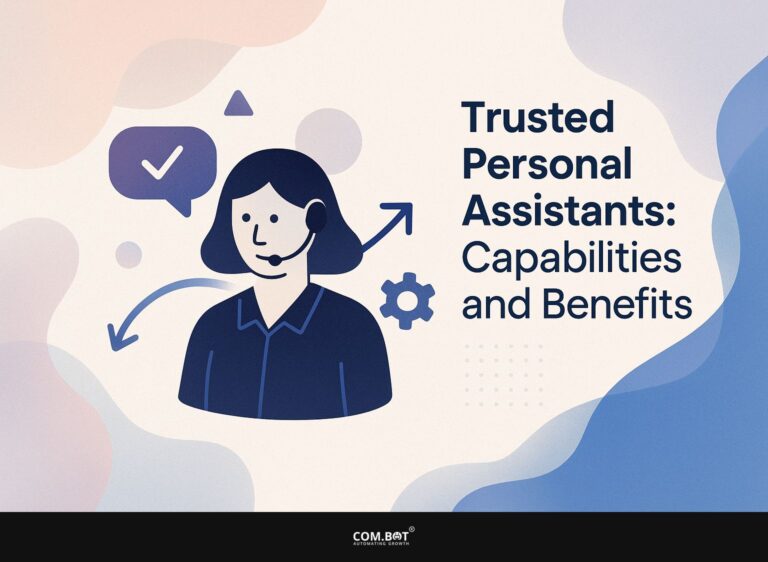Compliance Checks for WhatsApp API: Process and Importance
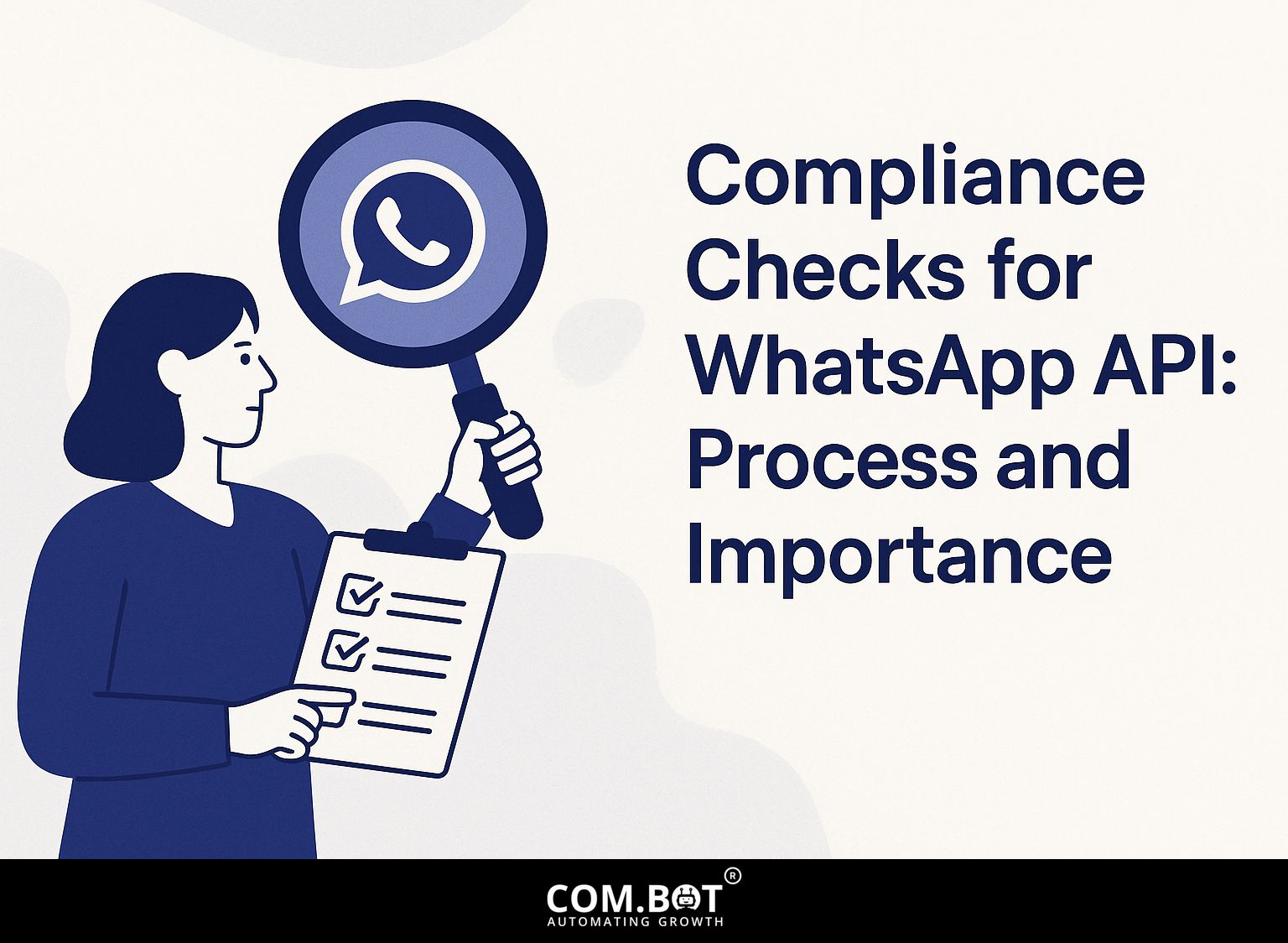
In the changing field of digital communication, it is important to follow rules for the WhatsApp Business API. With stringent privacy regulations like GDPR and CCPA in place, businesses must prioritize user consent to build customer trust. This article examines the compliance check process, showing its role in protecting user data and fulfilling legal requirements. Learn how good compliance reduces risks and improves your messaging approach.
Key Takeaways:
- Compliance checks are essential for following messaging rules and gaining customer confidence.
- Documentation plays a significant role in compliance checks and should be regularly updated.
- Staying updated with data protection laws and messaging guidelines can help avoid legal issues and potential pitfalls during compliance checks.
- 1 WhatsApp API Compliance and Usage Statistics
- 2 Compliance Check Process Overview
- 3 Key Compliance Regulations
- 4 The Role of Documentation
- 5 Challenges in Compliance Checks
- 6 Benefits of Compliance
- 7 Frequently Asked Questions
- 7.1 1. What are compliance checks for WhatsApp API?
- 7.2 2. Why are compliance checks important for WhatsApp API?
- 7.3 3. What is the process for compliance checks for WhatsApp API?
- 7.4 4. Who is in charge of doing compliance checks for WhatsApp API?
- 7.5 5. What happens if a business fails a compliance check for WhatsApp API?
- 7.6 6. How frequently are compliance checks performed for WhatsApp API?
1. Understanding the WhatsApp Business API
The WhatsApp Business API lets companies set up automatic responses and use rich messaging options to make communication with customers easier. By using automatic messaging, companies can create fast, custom replies to frequent questions, improving customer happiness and shortening reply times.
For example, a travel agency might use programmed responses to give details on flight times or how to book tickets. Using rich media such as images and documents helps convey information more effectively. Tools like Twilio or MessageBird can easily connect with the API, facilitating seamless connectivity.
By using these features, organizations build effective communication strategies, leading to strong customer loyalty. This approach aligns with the principles outlined in our analysis of WhatsApp Business: Features, Benefits, and Strategies.
2. Importance of Compliance in Messaging
Following messaging rules helps keep customer information safe and builds trust, which is important for lasting business success.
Studies show that 76% of consumers are more likely to engage with businesses that demonstrate compliance with data protection regulations. Using a compliance system like GDPR or CCPA makes sure that data collection methods are open and follow ethical standards.
Regular inspections and employee education are important ways to maintain compliance. Tools like OneTrust or TrustArc can help with tracking and reporting compliance, which builds customer trust.
By focusing on compliance, businesses reduce risk and build a loyal customer base who feel safe when dealing with them.
WhatsApp API Compliance and Usage Statistics
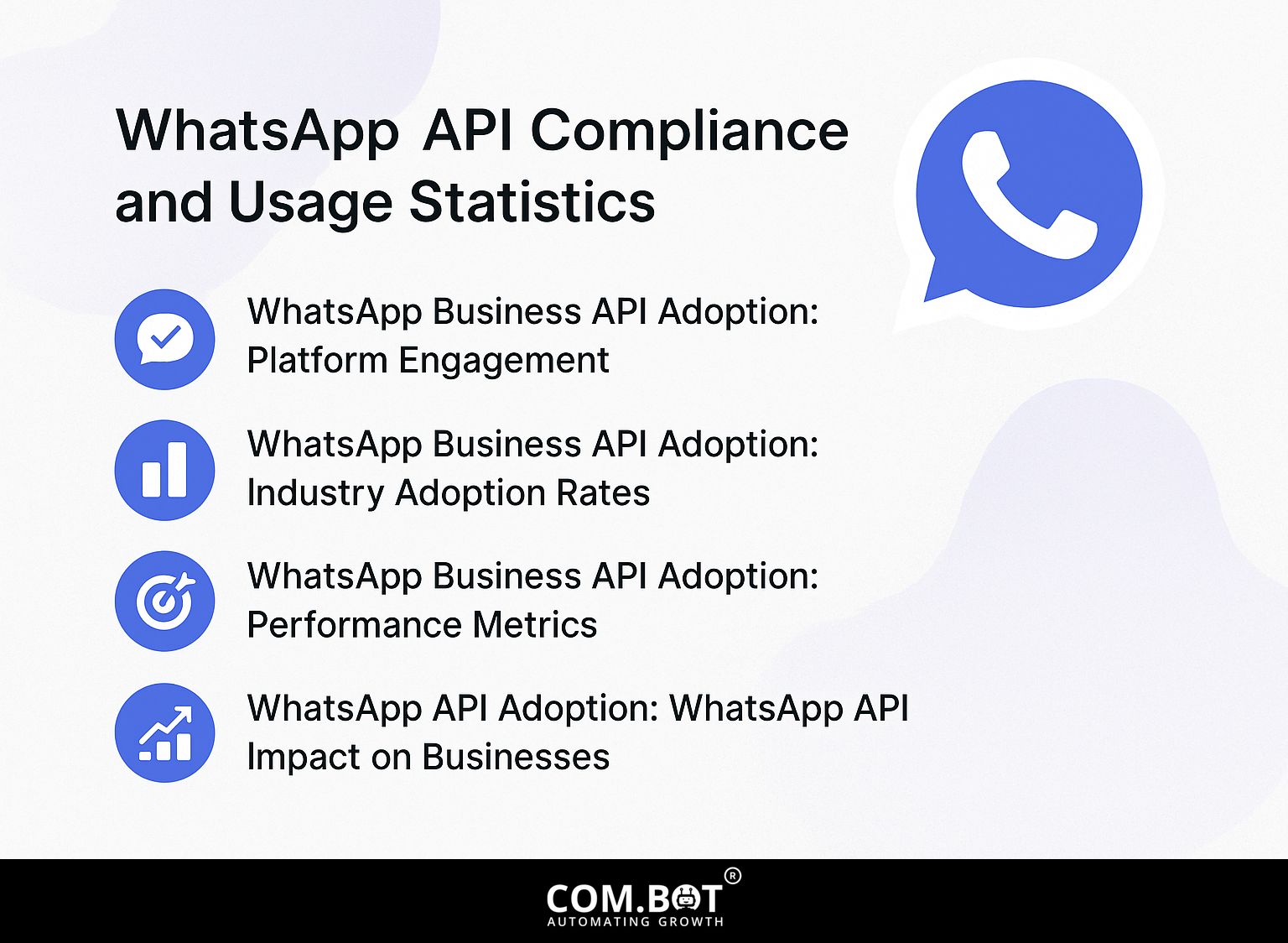
Understanding the WhatsApp API’s compliance standards is crucial for effective integration and usage. For a deeper look into how media messages are managed and optimized, see our article on WhatsApp API: Sending Media Messages and Best Practices.
WhatsApp Business API Adoption: Platform Engagement
WhatsApp Business API Adoption: Industry Adoption Rates
WhatsApp Business API Adoption: Performance Metrics
WhatsApp Business API Adoption: WhatsApp API Impact on Businesses
The WhatsApp API Compliance and Usage Statistics Give a detailed summary of how different industries use WhatsApp Business API and its effects. The data shows how companies use the platform to increase interaction, improve conversion rates, and make operations more efficient.
WhatsApp Business API Adoption showcases impressive User Open Rates of 98% and Message Click-Through Rates at 52.5%, emphasizing the platform’s effectiveness in capturing user attention. Additionally, 60% customer engagement through chatbots Shows the increased use of computer-driven conversations to improve how customers feel about the service.
- Industry Adoption Rates: Highlighting broad sector embrace, 80% of large enterprises plan to adopt the API by 2025, with significant uptake in the travel industry (83%), retail (78%), and financial services (65%). The healthcare sector follows with 52% adoption, indicating varied readiness across fields.
Performance Metrics illustrate the API’s impact on business outcomes. Notably, a higher conversion rate of 80% with fast replies highlights WhatsApp’s part in improving sales efficiency. In retail, a 5% sales conversion rate and a 37.5% improvement showcase significant gains, while financial services benefit from a 30% reduction in communication costs. Healthcare sees a 15% reduction in no-show rates, highlighting improved patient appointment adherence.
WhatsApp API Impact on Businesses reveals 5 million businesses using the API, demonstrating widespread acceptance. The 35% reduction in response time facilitates faster customer interactions, contributing to $1.7 billion in sales through WhatsApp conversions, reflecting the API’s substantial economic impact.
These numbers show how important the WhatsApp Business API is for updating communication methods, increasing engagement, and improving business operations. As more people start using these technologies, businesses can look forward to improved customer communication and smoother operations.
Compliance Check Process Overview
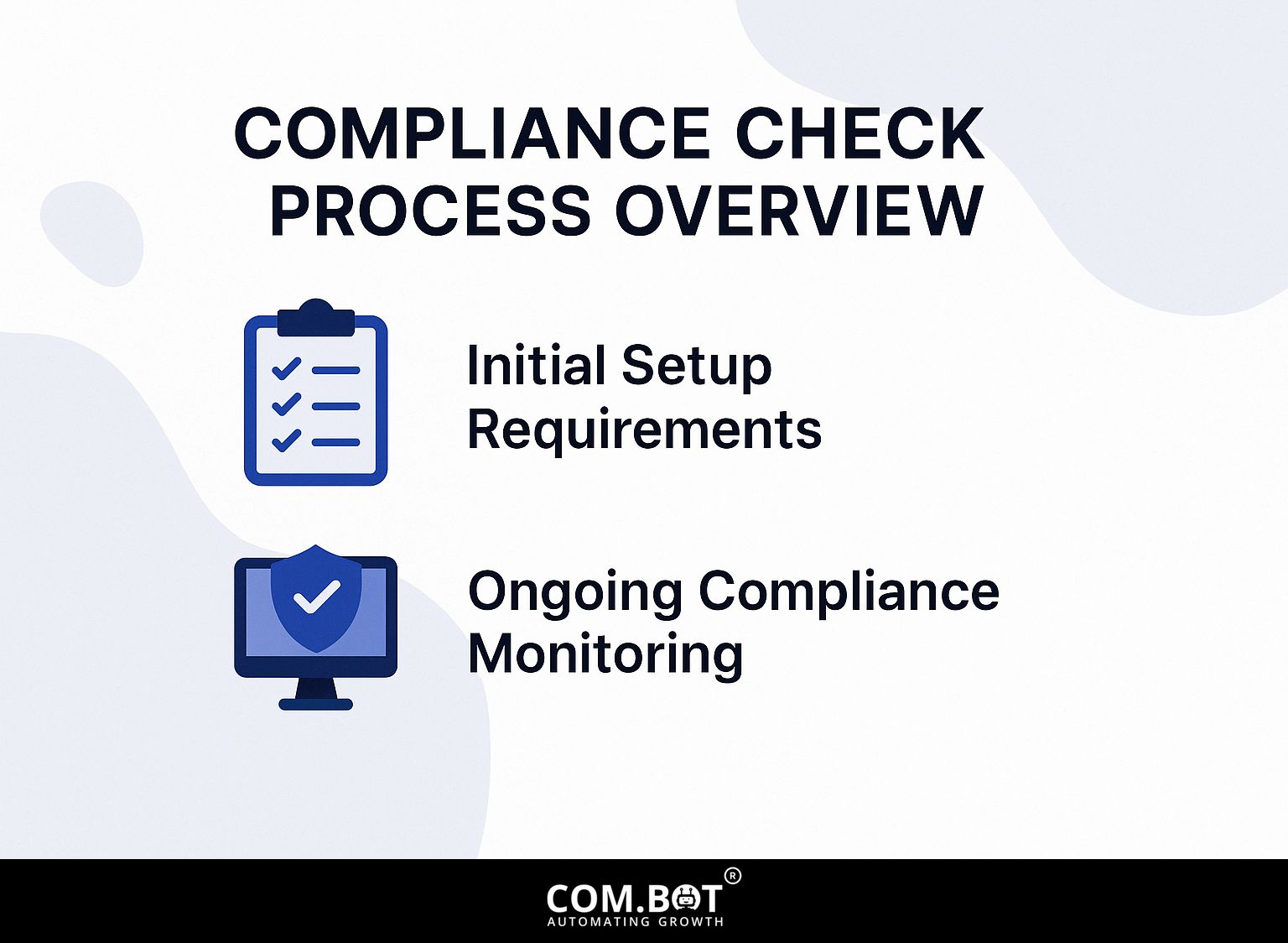
Setting up a planned process for compliance checks is necessary to make sure your use of the WhatsApp Business API follows legal and moral guidelines.
1. Initial Setup Requirements
To meet compliance standards, businesses must fulfill specific initial setup requirements, including obtaining explicit customer consent and implementing secure data practices. This method begins with a practical consent management tool such as OneTrust, which can simplify opt-in procedures (approximately $300/month).
Next, protect customer data by encrypting it with tools like TLS (Transport Layer Security) while it is being sent to keep sensitive information secure.
Adopt data minimization practices by only collecting essential information, thereby reducing risk. Frequent reviews of your compliance methods are important, and tools such as TrustArc can help watch and uphold compliance rules all the time.
2. Ongoing Compliance Monitoring
Regular checks are important for adjusting to new regulations and keeping up with messaging rules.
- To comply with rules, perform audits every three months. Use tools like ComplyAdvantage for live tracking, with a yearly cost of about $1,800.
- Make sure to set up and keep thorough records of audits; these documents will be important during checks by regulators. Track changes in privacy laws with resources like the International Association of Privacy Professionals (IAPP) to stay updated.
- By implementing these methods, your organization can proactively address compliance risks before they become problematic.
Key Compliance Regulations
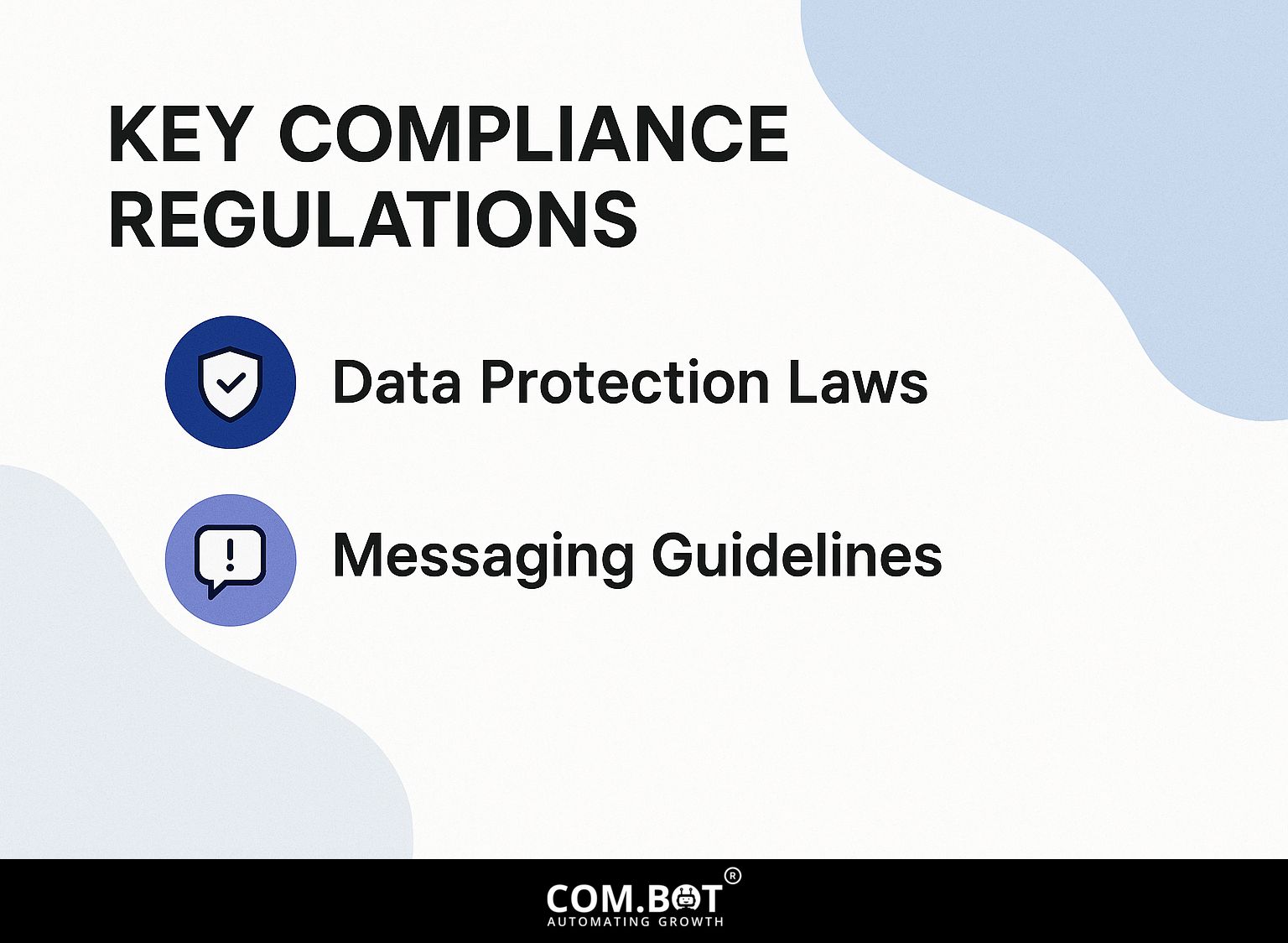
Knowing important compliance rules is necessary for companies using the WhatsApp Business API to safeguard customer information and prevent legal issues.
1. Data Protection Laws
Data protection laws like GDPR and CCPA set stringent standards for data handling, providing rights such as the right of access and data minimization principles.
Under GDPR, WhatsApp must let users ask to see their data and remove it if they want, showing their right to deletion. CCPA similarly mandates transparency about data collection practices, requiring clear disclosures.
Breaking the rules can lead to severe penalties: GDPR fines can be up to 4% of annual worldwide revenue or EUR20 million, depending on which amount is higher; CCPA fines can be as much as $7,500 for every violation.
To effectively lower these risks, companies should use solid data management methods and carry out regular checks.
2. Messaging Guidelines
Following WhatsApp’s messaging rules makes sure messages meet standards and prevents problems like account suspension.
Key guidelines include prohibiting spammy behavior, ensuring users opt-in to receive messages, and avoiding sensitive content such as hate speech or misleading information.
For example, a compliant message could be a promotional offer sent to users who have explicitly requested updates, while a non-compliant message might involve unsolicited advertisements sent to random contacts.
Maintain clear subscription options to allow users to opt-out easily, thus respecting their preferences and enhancing your brand’s credibility.
The Role of Documentation
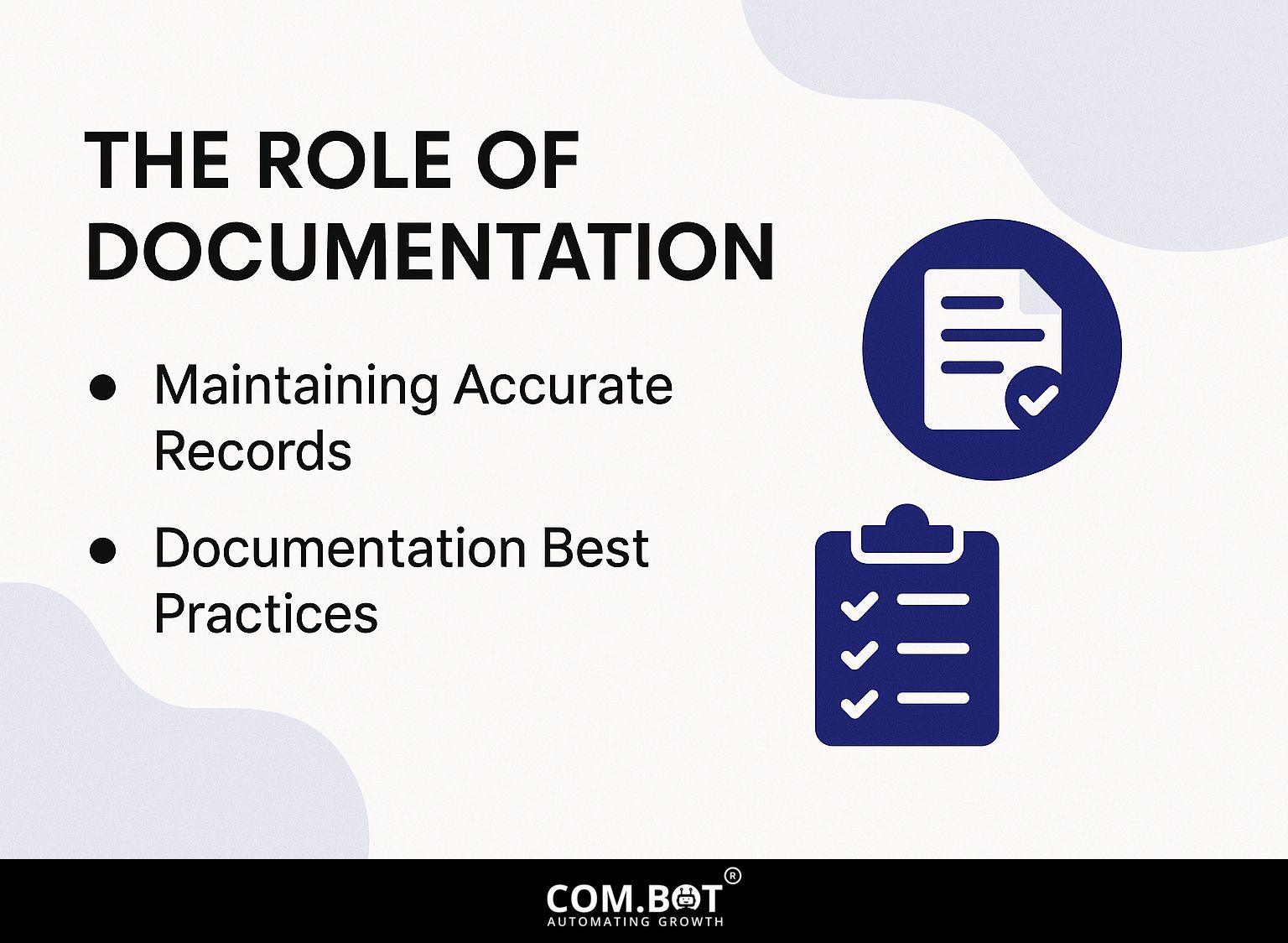
Keeping accurate records is important for following rules and properly managing customer information in communication systems.
1. Maintaining Accurate Records
Accurate record-keeping, such as audit trails and consent logs, is crucial for meeting regulations and maintaining transparency with customers. Use tools like DocuSign to get consent records, which provides secure signing options for around $10 each month.
For record-keeping, consider Google Workspace for document organization and sharing, ensuring that all stakeholders have access to necessary records.
A project management tool like Trello can help track tasks and compliance status, allowing teams to collaborate effectively. Reviewing records every three months keeps them updated with changes in rules or company policies.
2. Documentation Best Practices
Following good documentation practices helps manage compliance smoothly and reduces the chance of legal problems.
To achieve this, focus on a few strategic actions. Regularly updating compliance checklists will keep your documents current and relevant.
Version control is important because it lets you track changes and makes sure everyone on the team has the most up-to-date document. Make sure documents are easy to locate during audits, as these often require rapid access to details.
Provide training sessions for staff to teach them documentation guidelines, ensuring everyone understands their responsibilities and the importance of adhering to these guidelines. By doing so, your organization reduces risks and promotes a culture of accountability.
Challenges in Compliance Checks
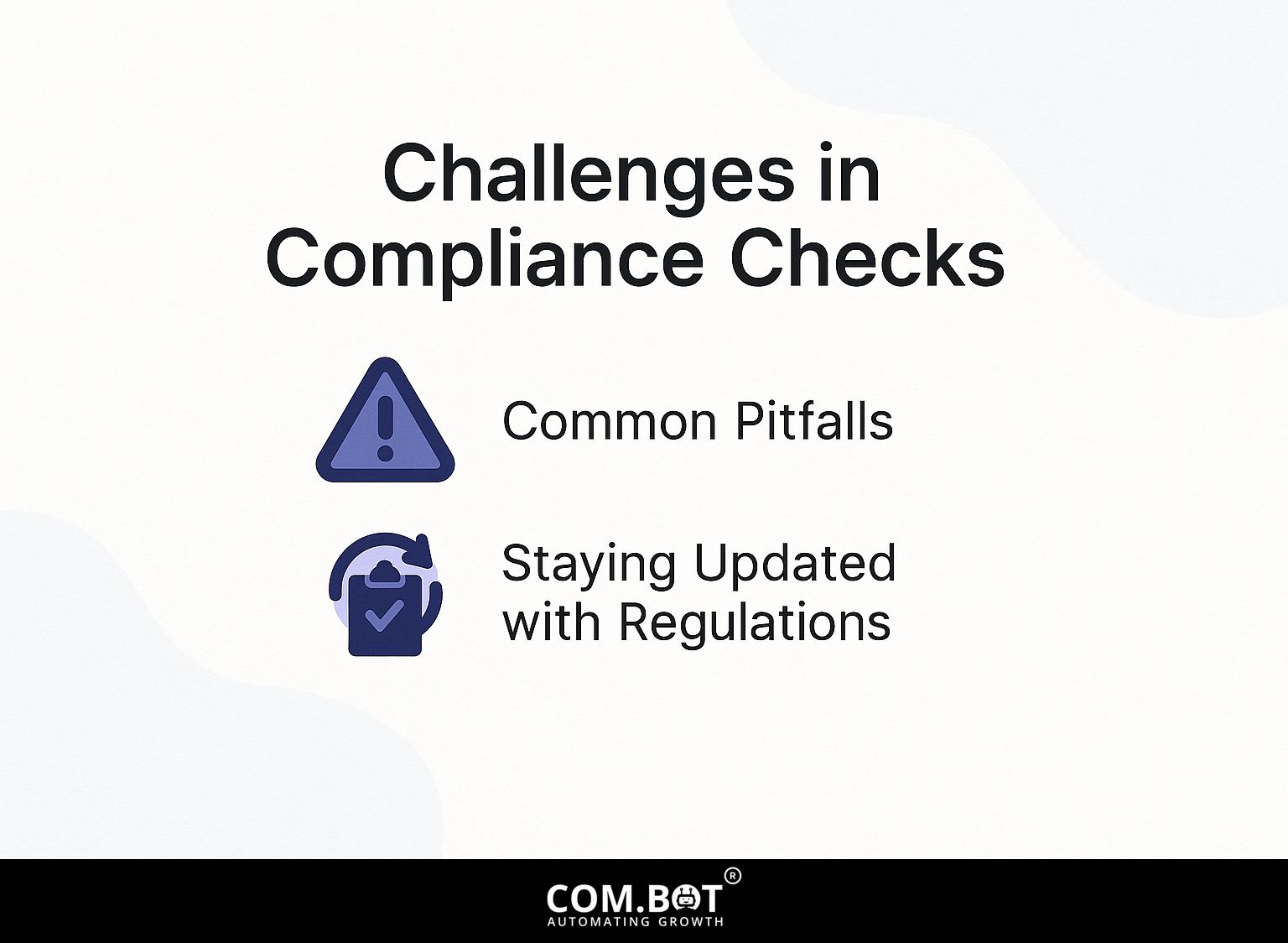
Businesses encounter various difficulties when carrying out compliance checks, which can limit their effective use of the WhatsApp Business API. For an extensive analysis of these challenges and solutions, our deep dive into WhatsApp CRM Integration explores how third-party tools might mitigate these issues.
1. Common Pitfalls
Finding typical mistakes in compliance reviews can prevent businesses from expensive legal issues and improve communication effectiveness. To effectively mitigate these risks, focus on three key areas.
- First, keep detailed records of all compliance procedures; this gives a clear account for audits.
- Next, prioritize customer consent. Implement transparent opt-in forms to gather explicit permissions, safeguarding against data misuse.
- Stay informed about regulatory changes by subscribing to industry newsletters or joining compliance forums.
This proactive method keeps your business safe and creates confidence with your audience, showing your dedication to fair practices.
2. Staying Updated with Regulations
Regularly updating knowledge about regulatory changes is imperative for businesses to remain compliant and protect customer data.
One effective method is to subscribe to legal newsletters, such as those offered by the International Association of Privacy Professionals (IAPP). Think about using compliance tools like TrustArc, which offers detailed information starting at $200 per month.
Attending webinars or training sessions is another useful method; for instance, platforms like Cvent host events that increase knowledge.
Joining industry forums or discussion groups lets you keep in touch with peers and exchange updates instantly, building a community-focused knowledge base.
Benefits of Compliance
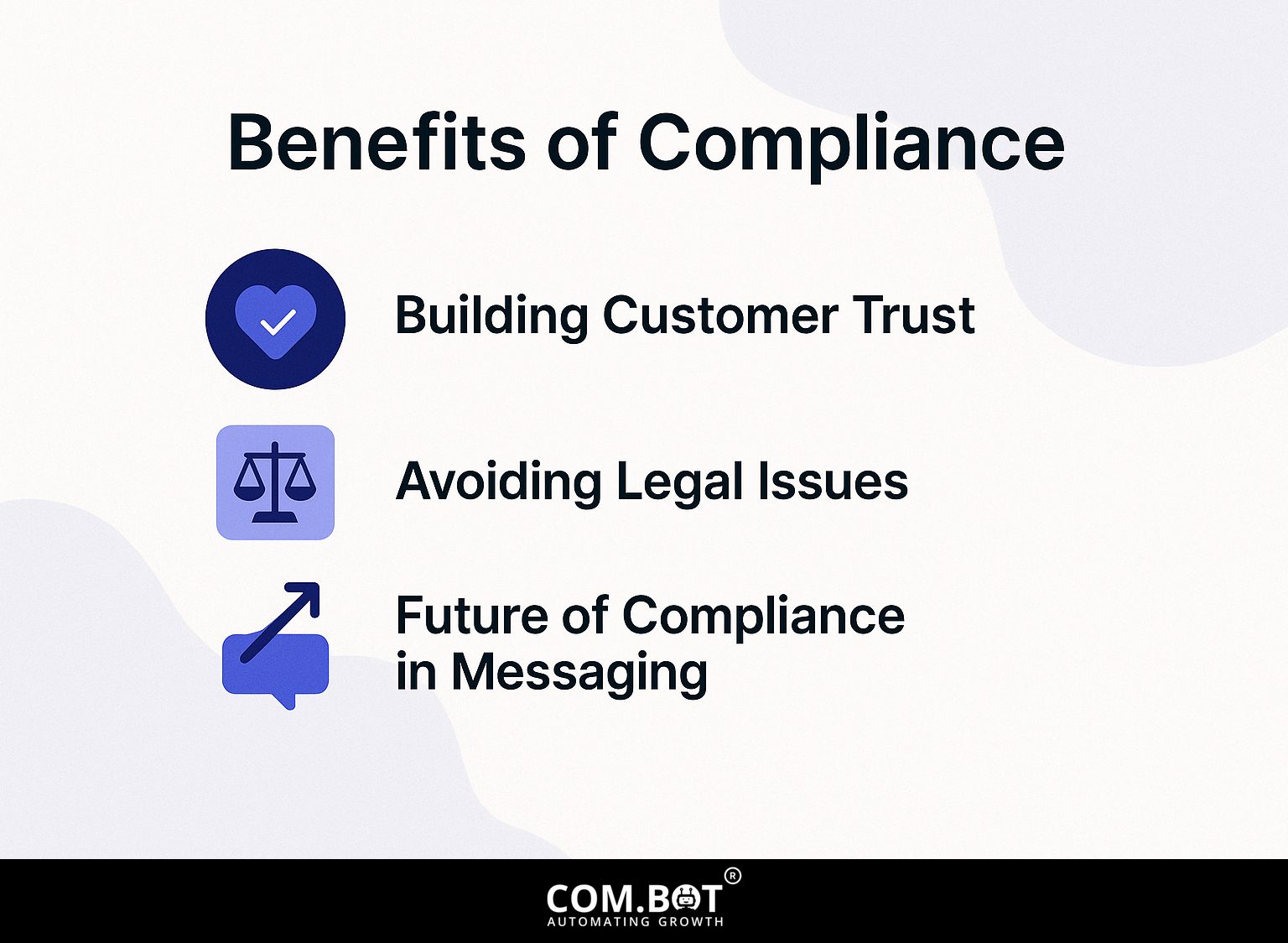
Meeting messaging rules results in more customer trust and lowers legal problems. This is especially important when using platforms like WhatsApp, where understanding the nuances of WhatsApp API security, privacy, and compliance can further enhance trust and safeguard against potential issues.
1. Building Customer Trust
By following privacy rules, businesses can earn customer trust and create lasting relationships.
To build customer trust, businesses should use clear data usage policies. For instance, providing a transparent privacy policy that details data collection and processing can reassure customers.
It’s important to use clear opt-in methods for marketing messages. Services like Mailchimp or HubSpot help with this.
Regularly updating customers on how their data is used through newsletters can strengthen trust. By following these steps, companies follow regulations and start conversations with their clients, showing a dedication to privacy and ethical behavior.
2. Avoiding Legal Issues
Proactively managing compliance can help businesses avoid significant legal issues and penalties associated with non-compliance.
For example, in 2018, the British Airways data breach resulted in a GBP20 million fine due to inadequate security measures. Similarly, Facebook faced a $5 billion penalty for privacy violations under the GDPR.
Setting up a strong compliance system requires regular checks, employee training, and the use of tools to track rule changes.
Tools like ComplyAdvantage can provide real-time risk assessments, while training platforms like Coursera can help educate staff on compliance topics, ensuring that your organization remains vigilant and well-informed.
3. Future of Compliance in Messaging
New developments in compliance, like the growing importance of data protection and changing rules, will influence how messaging strategies are planned.
Businesses must remain competitive by using strong compliance systems and adding compliance tools to their messaging platforms.
For instance, using software like OneTrust or TrustArc can help manage consent and data privacy. Regular checks are important to stay in line with rules such as GDPR and CCPA.
Being clear and honest, such as offering easy-to-understand opt-in options and privacy details, helps build trust with customers. By actively changing messaging strategies to address these compliance challenges, companies can avoid penalties and improve their reputation.
Frequently Asked Questions
1. What are compliance checks for WhatsApp API?
Compliance checks for WhatsApp API refer to the process of ensuring that businesses using the WhatsApp API are following all rules and regulations set by WhatsApp and regulatory authorities.
2. Why are compliance checks important for WhatsApp API?
Compliance checks are important for WhatsApp API to maintain the integrity of the platform and protect user data. They also help to prevent fraud and misuse of the API.
3. What is the process for compliance checks for WhatsApp API?
The process for compliance checks for WhatsApp API involves businesses submitting their information and use cases to WhatsApp, undergoing a review process, and receiving approval before using the API.
4. Who is in charge of doing compliance checks for WhatsApp API?
WhatsApp performs compliance checks for the WhatsApp API. They have a team that checks all businesses using the API to make sure they follow the rules.
5. What happens if a business fails a compliance check for WhatsApp API?
If a business fails a compliance check for WhatsApp API, they will not be allowed to use the API. They may also face penalties or legal action for non-compliance.
6. How frequently are compliance checks performed for WhatsApp API?
Regular audits are done for WhatsApp API to confirm it follows rules and regulations. Businesses may also be randomly selected for spot checks at any time.
